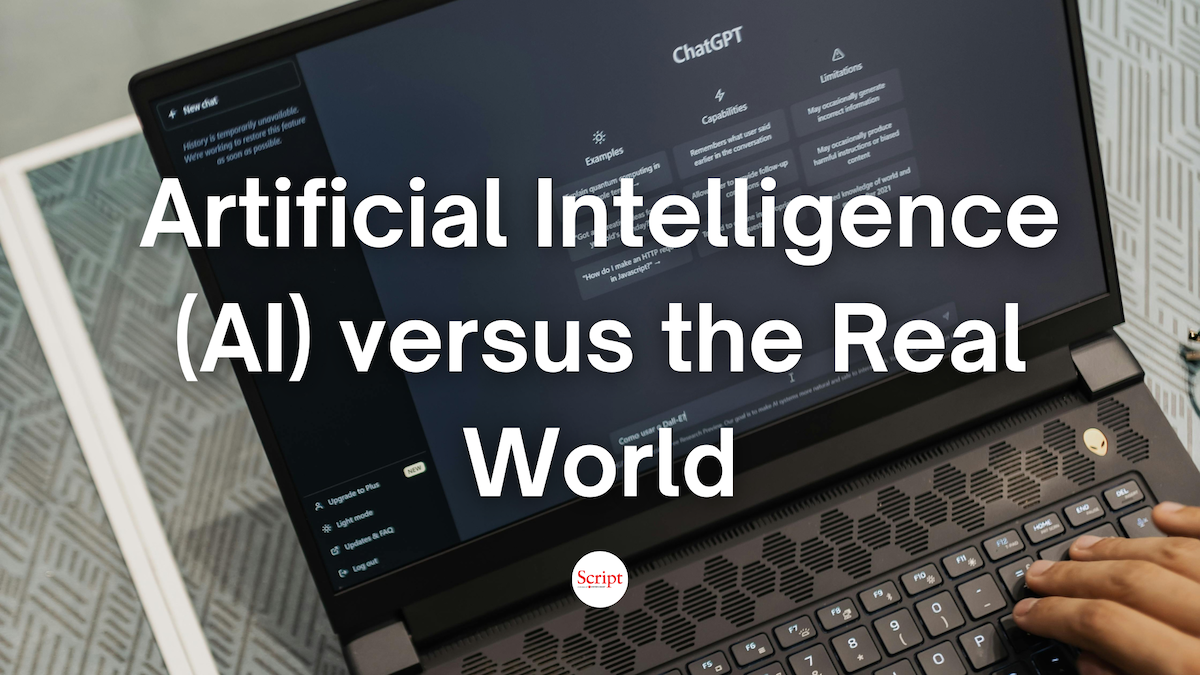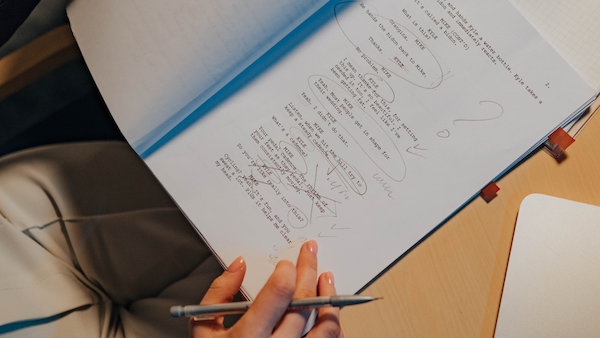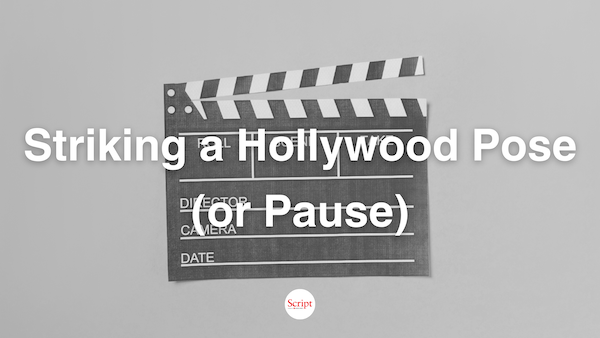It Depends – AI and The Writer: What Virtually No One is Talking About, Yet
There is lots of talk about Artificial Intelligence, or AI, and its impending impact on professional writing in all of its forms. Is it going to be doom and gloom or unicorns and rainbows?
There is lots of talk about Artificial Intelligence, or AI, and its impending impact on professional writing in all of its forms. Is it going to be doom and gloom or unicorns and rainbows? A lot has been said of its quality (or lack thereof,) veracity (or lack thereof,) and its propriety (should this even be a thing?) But there is a considerably empty slot in the conversation in one area that could (and will,) greatly impact whether and how AI is utilized in all writing professions.
WGA stance on AI
An example of the current film industry buzz about AI and its potential impact on professional writers can be seen with what the WGA is saying. The Writer’s Guild of America West has issued initial statements of their thinking on the subject, which they itemized recently in a series of tweets from their official account.
The considerations are relevant now, since the WGA is actively in contract renegotiations for their collective bargaining agreements with Hollywood. The way AI created work is to be handled will have a great impact on the status of writers and can have massive economic impacts, both for good and bad. We will see how the negotiations fall out and how AI created works get incorporated, if at all, into the screenwriters’ world.
The US Copyright Office stance on AI
Because AI can be used to create “original” creative works the question of their copyrightability has to be addressed. The questions abound not only for writers but for artistic works of all media so the US Copyright office has been one of the first arenas turned to for answers on how the matter would be handled in the legal realm. The US Copyright office has issued its opinion as to how it currently stands on the matter.
The most pertinent case law trends cited in the opinion return to a key component for copyright that is missing in anything that is truly created by AI, the requirement of a human author for a work to be considered copyrightable. So far, courts have consistently withheld ownership and authorship rights from non-human actors. No one expects the automated traffic cams to own the copryight to the license plate collages they’ve created by following their software directions. Nor have courts found that a monkey that steals a human photographer’s camera and take dozens of pictures including a selfie has created a copyrightable work, let alone somehow “assigned” the work to the camera’s owner.
As I’ve said before on these pages, it takes more than an idea to be a copyright protectable work. It takes the execution of that idea in an tangible and complete form. And now, it seems clear that that expression of the idea must be executed by a creative, human author. No substitute will do.
We’ll have to see if the courts continue to support this reasoning in future cases. But as for now, any creative work created by something that is not a human by default, immediately falls into the public domain, which is the fate of every creative work eventually. Copyright is only a time limited deferal of that fate for all works.
And we have to always remember that not everything is copyrightable. Copyright only applies to the listed categories of works in the relevent statute of the given governmental body, even if “authored” by a human. For example, many don’t know that in the US, extemporaneous speech is not a category available for copyright protections. So if you talk off the top of your head, you haven’t created a copyright protectable work. (So, if you said something worthwhile, go write it down.)
How AI differs from Spellcheck
Some have wanted to argue that, “We’ve already been using computers to assist in our writing. This is no different.” And they’ve pointed to things like spelling and grammer checkers to make their point. But it is important HOW the computer assist is used that makes all the difference. If you are using a computer to assist your own creativity and the suggestions are corrective in nature, that’s considerably different than asking the computer to tell you a story and letting the computer “create” all the twists and turns of the characters and plot. Of course there will be grey areas muddying just where the creative elements are coming from and those will have to be discerned and rooted out individually in order to determine if the vague line of distinction being drawn here has been crossed yet.
I can imagine a day when studio notes may be “given” by an AI on a screenwriter’s draft. The notes wouldn’t be copyrightable, but, they’d be based on the created story and may suggest something that wasn’t in the original draft as a solution. If the writer takes the suggestion and runs with it in a new draft, where was the new twist “created” and by whom? (This is one of those slippery slopes being discussed in the WGAw dialog even now.) How these close cases will be determined, only time will tell.
Technology changes and so does politics and the law
Some dismiss the pitfalls of AI saying that the technology is “not there yet,” to be of real concern. But this kind of argument misses the point. I’ve been personally aware of the developments of AI for decades, since I learned to code in LISP back in college (an early AI programming language base.) I know what the current crop can do- and can’t. And there are certainly limitations to what is possible at the moment. If you are aware of those limitations you can still achieve wonderful things. If you are ignorant of them, you can cause huge problems (e.g. inaccuracies swamping news reporting for AI written stories.) The technology isn’t sufficiently developed where it can do everything people are dreaming of it doing. But, someday, it may get there, so if you ignore the issues at best you are just putting your head in the sand and ignoring a question until you can’t anymore.
There could be a day in the future where AI lives up to more of its potential and its output becomes truly tempting to use as a source. And the political and legal winds could change along with those desires to find a cheaper, easier way to create works. No one knows how the future will unfold. As I’m often apt to say, it depends. But if the rise of the machines gets to the point where non-human authors can be given authorship to copyrights, it’s not just the writers who need to worry. There’ll likely be a line of monkeys who want to give up their still cameras and move into cinematography as their next medium of expression. The old expression was, “when pigs fly.” Maybe the new one should be, “When monkey’s direct.”
Legal complications with trying to use AI in the business of writing
Currently, creativity, and its source, must meet the criteria of copyright law: de minimus amount of creative expression and human sourced. And sight should not be lost of where the actual value lies in creative works, the exclusive control over exploitation of the work. Here, using AI wrongly can cause massive problems.
Pitch sessions usually aren’t sufficient to protect anything. So typing a prompt (the “pitch,”) into an AI chatbot that spits out a script isn’t sufficient source material to acquire the authorship of the output. A producer giving the same prompt to a human writer acquires the output by contractual assignment – either as work made for hire or through legal assignment with all the right elements (e.g. signed writing transfer.)
Since a bot created work cannot fall under any definition of work made for hire (not an employee work made in the course of their regular duties, or an independent contractor’s output assigned correctly in the contractual language within one of the limited categories that can qualify for IC WMFH.) It must be assigned, but, a bot is not a legal entity that can enter into a contract, and that’s the only way it could be assigned. As we’ve established above, since a bot created work doesn’t qualify as copyrightable, the work is immediately in the public domain.
Therefore, a studio looking to replace creative writing with bot created “original” work will cause a heap of trouble completely losing the monetary value of control of the (nonexistent) copyright of the creation. I foresee this being realized quite quickly when a blockbuster gets immediately copied and replicated and the lawsuit reveals there was no copyright in the original to protect. Though there are other protectable elements in a film, the copyright is the main anchor for investment and profit.
Does this mean no AI use in writing in the future?
The short answer is no. As long as you use the AI derived material as a tool to assist in the creative germination process it can be a great asset. We already use similar tools, e.g. name generators to create believable character names as we write the main story. Just because the writer didn’t sit down and think of all the possible names of characters themselves doesn’t mean the story written using those names is any less the story of the writer’s creativity. I could foresee using AI as a prompt to find a way of getting out of a plot conundrum that has you stuck. (“Ways of surviving a five way gun standoff that hasn’t been done already.”) Once the AI gives you the structure, the writer then creates the scenario in their own words and style and the end result is creative (by the human writer,) and likely entertaining and less tropish.
Keeping the creativity in the hands of the human writer is key. The tools they use are only there to support the process. As long as this is kept in mind, there’ll be a place for human writers and AI bots to get along and thrive.
Learn more about the craft and business of screenwriting and television writing from our Script University courses!
Christopher Schiller is a NY transactional entertainment attorney who counts many independent filmmakers and writers among his diverse client base. He has an extensive personal history in production and screenwriting experience which benefits him in translating between “legalese” and the language of the creatives. The material he provides here is extremely general in application and therefore should never be taken as legal advice for a specific need. Always consult a knowledgeable attorney for your own legal issues. Because, legally speaking, it depends... always on the particular specifics in each case. Follow Chris on Twitter @chrisschiller or through his website.







